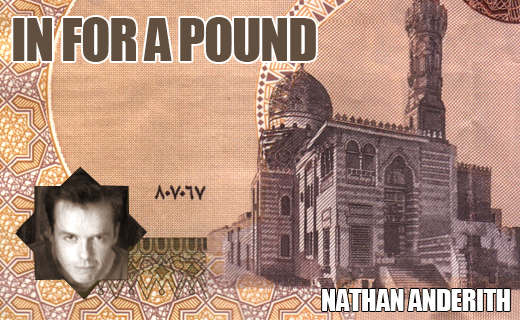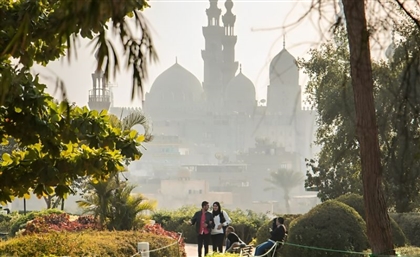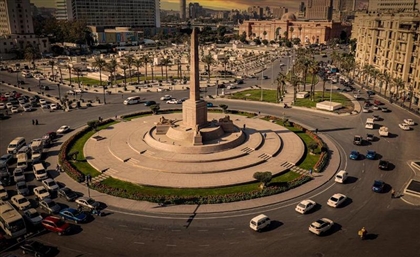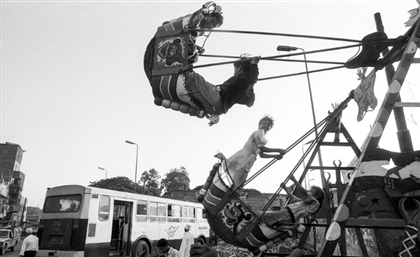Dammed if You Don't
With the government up in arms about Ethiopia's Dam, Nathan Anderith explains that denial might lose us the Nile altogether.

Water’s one of those things you don’t really think about until you don’t have it, like air or Sakkara. Drink it, flush it, wash in it, there’s always more. Why worry? The Nile’s been flowing for a couple hundred million years now, and isn’t going to dry up tomorrow. If there’s one thing Egypt can always count on, it’s that that big ol’ creek’ll always be around –unless Ethiopia steals it.

That’s the big hullabaloo in Egyptian news lately. Like a skinny Carmen Sandiego, Ethiopia is swiping Egypt’s greatest treasure, diverting part of the river to make way for a massive hydroelectric dam. It shocked the country, as they only had three years’ warning, and everyone is in a tizzy.
I’ve heard lot of opinions about whether the dam will cut into Egypt’s share of the Nile or not, and frankly I don’t have the expertise to tell you one way or the other. I do know, however, that if Ethiopia does take some of Egypt’s share, they deserve it, and frankly, Egypt deserves to lose it, because it’s horribly misusing the water that it has.
The current agreement governing who gets how much Nile was cooked up back in 1929 by the old colonial masters of North Africa. None of the little riparian (river-using) countries in the Nile Basin got to sit in on that meeting, so they got hosed, so to speak. Egypt and Sudan got 90%, leaving 10% to share between Egypt, Sudan, Ethiopia, Uganda, Kenya, Tanzania, Burundi, Rwanda, and the Congo. Seems fair. Since then, any time one of the smaller countries complained, Egypt responded with the rationale that 1: those countries get a lot more rain, so they need the Nile less, and 2: guns.

The thing is, the river can be used for a lot more than a water source; it’s also quite helpful for keeping the lights on. Only about 14% of Ethiopians have power, 2% in the villages. You know how annoying these blackouts have been? Imagine one that lasts your whole goddamn life. Their population is growing faster than Egypt’s, too, their agriculture sector is growing, and climate change has been hurting rainfall. Egypt’s also not quite the regional heavyweight it once was, and a military assault over water is just so last century.
That’s why the rest of the riparian states decided in 2010 that they’d had enough of this nonsense and wrote themselves a new agreement to share things out more equitably. Egypt refused to sign, of course, but the countries that did are upstream, so all Egypt could do was shake its fist in spittle-flecked rage as it saw its near-monopoly slip away.
But is that such a bad thing? Nothing embarrasses like riches, and Egypt’s been gorging itself on Nile water in a dangerously irresponsible way. The country’s water reserves are about 700 cubic meters per person per year, a number that’s shrinking by the day. The sufficiency level, by the way, is 1,000, meaning that Egypt is officially water poor. Despite that, it’s got one of the most inefficient water usage systems in the world, with only 70% of the water ever getting used – 30% gets lost to leaky pipes and evaporation. Per capita water use is higher than most European countries; geographically-minded readers might recognise Europe as a place where it rains more than twice a year, while Egypt, for those who’ve forgotten, is a fucking desert.
The whole country seems to’ve forgotten that, actually. Folks wash their cars with gallon after gallon of fresh water, while rich suburban enclaves glitter with sapphire swimming pools and emerald golf courses. Gardens are watered by dropping a hose on the ground and wandering away. And the sidewalks. What the hell is the deal with watering the sidewalks? Can someone please explain this in the comments box below? Why in God’s name does every shop owner feel the need to drench the pavement six times a day? WHAT DOES THAT ACCOMPLISH? WHAT KIND OF MASS PSYCHOSIS IS THIS?

Ahem. Sorry. In all fairness to those guys, even if they stopped tomorrow it wouldn’t make much difference. Personal water use is only about ten percent of the total. The real villains? Farmers. See, back in the day, the Nile liked to flood every year, which was a real inconvenience if you were trying to build a summer home but quite handy for planting stuff in the ground. It’s especially good for rice, which brings a good price but needs a lot of water to grow. Then President Nasser built the Aswan Dam, ending the flooding and leaving the farmers high and dry (and wasting a hell of a lot of water due to evaporation). He had to compensate them, so he invested in a complex irrigation system, teaching farmers how to use water more efficiently and shifting them away from water-intensive crops.
Ha! Just kidding. He let them keep flooding their fields, but on the government’s dime, subsidising water to the point where it was essentially free. Like every other idiotic subsidy, it continues to this day, so farmers have no incentive to control their usage or invest in irrigation. They’re still growing rice, which is absolutely crazy in the desert, and their planting season is right smack in the middle of the summer, the same time as peak water demand.
The various solutions on the table aren’t too promising. You can’t cut subsidies, because they’ll come at you with pitchforks. You can’t install irrigation systems, because it’s too many tiny little farms to be financially feasible. Desalination’s all the rage these days, but it’s expensive and only works if you’re close to the sea. Wastewater treatment works great, but again we run into the almighty ick factor – even though it’s totally safe, no one wants vegetables grown with toilet water. Various aid groups have been teaching water-conservation techniques that also increase profits, but they can only reach so many, and farmers enjoy outsiders telling them how to do their jobs about as much as you do. Frankly, there’s no immediate impetus to change.
That’s why this damn dam might be a blessing in disguise. Folks. as a general rule only change when they have to, and if Egypt starts getting less water it might have to start charging people for it, which might be the push they need. We can’t be in denial forever, or else, one day, da Nile will no longer be with us.
Many thanks to Karim El Assir and Isabel Esterman, my water wizards, for most of the decent facts in this article. I'm solely responsible for all the lies.
- Previous Article I Got Banged!
- Next Article Nomades Land
Trending This Week
-
Apr 10, 2024
























